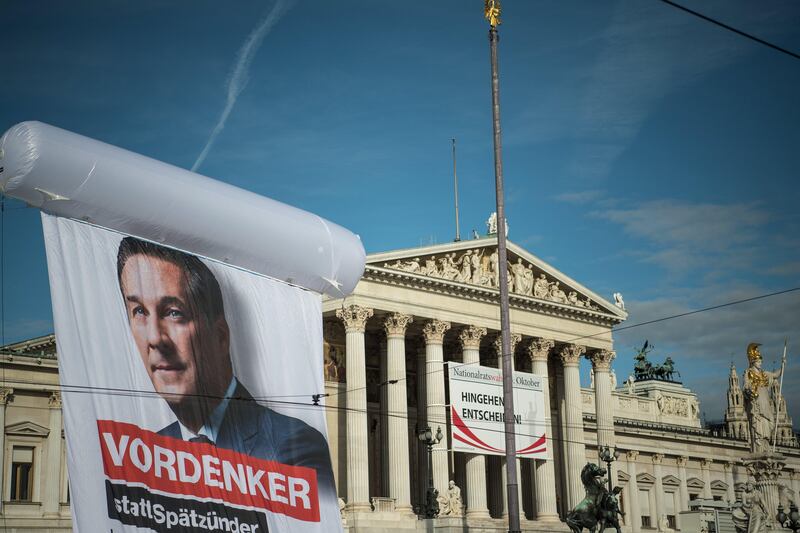Rudely awoken by clattering sounds from their front room, a young Austrian couple head downstairs to discover their home filled with uninvited guests playing computer games and rifling through their book cases.
The scene is from a mini-sitcom created for YouTube called The Hubers and by the end of the third episode, the intruders are replacing the couple's pictures, putting in meal requests and generally wrecking their home. The message is less than subtle: leave your door unlocked and you'll pay for it for life.
Created by Austria’s far-right Freedom party, the show is a political advertisement for this weekend’s elections and references the central planks of its programme: preventing the “Islamification” of Austria and promoting the rights of Austrian nationals over migrants. It plays into the concerns of the small central European nation which became a major transit hub during the 2015 migration crisis.
With each YouTube clip watched 1.6 million times, the message is proving to be a potent tactic in a campaign dominated by the themes of integration and immigration and is likely to see Heinz-Christian Strache emerge as leader of the second biggest party in Sunday’s poll and become part of the ruling coalition.
The result would mark a return to power for the party for the first time since 2005 during a short-lived and chaotic junior coalition role under its charismatic leader Jorg Haider, who died in a car crash in 2008.
After a period in the doldrums, Mr Strache’s party has emerged with an anti-immigration agenda that includes demands for strict controls on Muslim schools and kindergartens and a ban on handing out copies of the Koran in public places, according to his website.
The party was founded by former Nazis but has sought to leave its anti-Semitic past behind, expelling a series of party members for Hitler salutes and other breaches. The charismatic Mr Strache has said that Europe shares an enemy with Israel in political Islam.
Polls last week put his Freedom Party in second place on 27 per cent, behind the centre-right Austrian People’s Party on 34 per cent. The centre-left Social Democrats, whose leader Christian Kern is the country’s current leader, is predicted to be pushed down into third place.
Political analysts said that voting in Austria had been marked by a series of late swings, which could even make Freedom the largest party. "I think this is an election that's very difficult to predict," said political analyst Christoph Hofinger, whose company will provide election night forecasting for Austria's public broadcaster. "We might see some surprises on Sunday."
Whatever the outcome of the election, the success of the Freedom Party has pushed Austrian politics to the right. A Freedom Party candidate only narrowly lose in last year’s election for president, a largely ceremonial post.
Sebastian Kurz, the country’s foreign minister and new leader of the Austrian People’s Party, was behind a ‘burqa ban’ that came into force on October 1 and has adopted some of the policies of the far-right. Mr Kurz has also praised the leaders of Hungary for building a border fence to keep migrants out of EU territory
Success for the Freedom Party will reignite concerns about the rise of pro-nationalist, anti-immigration parties across Europe.
Fears were stoked by the UK’s vote to leave the European Union last year and the election of Donald Trump and only partially allayed by the victory of staunch pro-European Emmanuel Macron earlier this year.
Mr Hofinger said, however, that there was unlikely to be dramatic change if the Freedom Party was successful in the October 15 election. The Freedom party is likely to push its coalition partner to build closer links with Russia and to place even more roadblocks in the way of Turkey's ailing process to join the European Union, he said. "Not just to pause them, but to abort them," he told The National.







